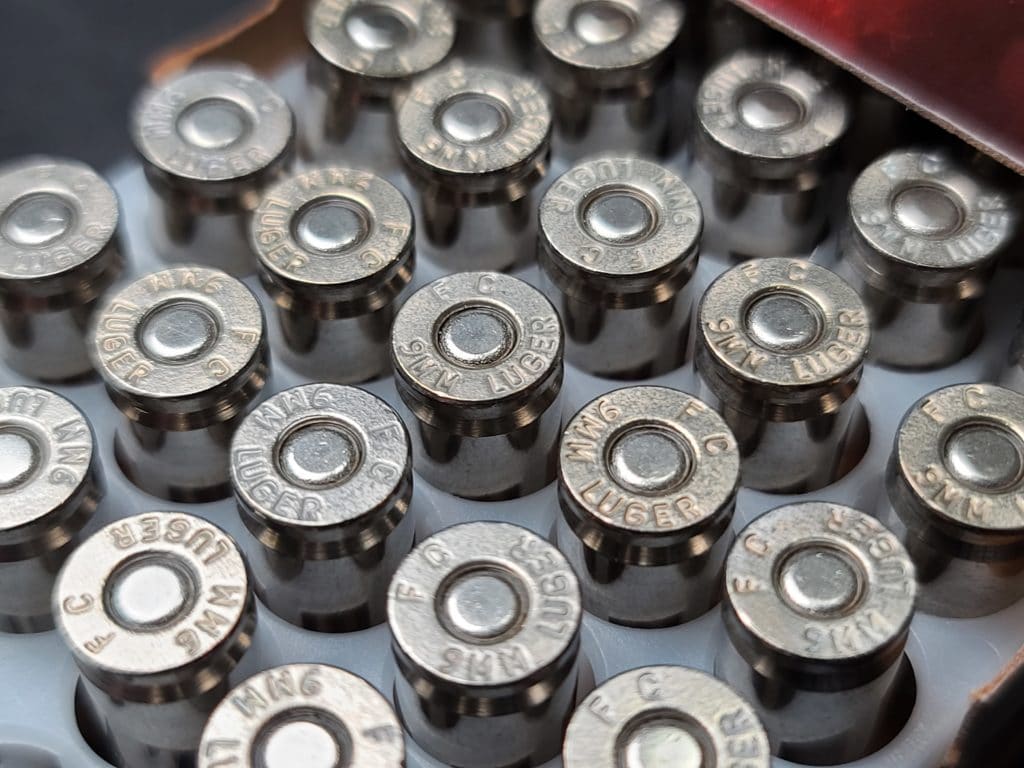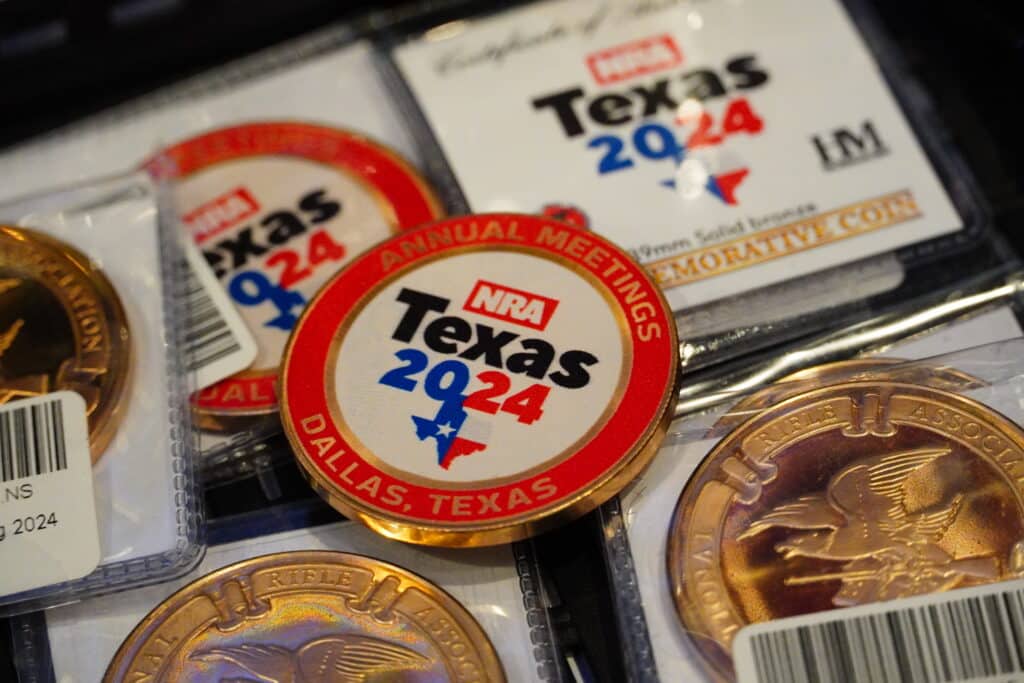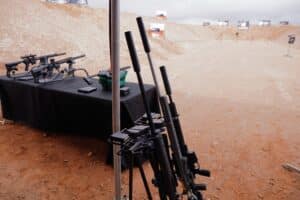After spending several days in Dallas covering the most momentous NRA Annual Meeting in years, I’m now up on the farm in Pennsylvania watching my mom’s horses. There’s some hard work involved, but the pace and country air offer a nice contrast to downtown Dallas.
The change of scenery hasn’t kept us here at The Reload from bringing you the best firearms reporting and analysis out there. First up is contributing writer Jake Fogleman who gives us a detailed breakdown of the latest developments in the Hunter Biden gun case. It looks like he’ll be going to trial in the middle of his father’s re-election campaign, and he’ll be using what sounds like an absurd argument at first glance. But, as Jake explains, it’s not as ridiculous as it might seem.
Then, I try to answer whether NRA reformers winning a bunch of leadership roles really means the group is changing. There are some reasons to remain skeptical. However, the new leaders have already implemented some significant reforms in less than a week.
Plus, NRA whistleblower Phil Journey gives his reaction to the group’s leadership change on the podcast.

Analysis: Where Hunter Biden’s Gun Case Stands [Member Exclusive]
By Jake Fogleman
On the eve of trial, Hunter Biden’s legal team has taken aim at what it means to be an “addict” for purposes of federal law while shifting Second Amendment jurisprudence continues to shadow his prosecution.
After multiple unsuccessful attempts to have his case dismissed, the President’s son is set to stand trial on federal gun charges beginning June 3rd. Specifically, a jury will decide if he is guilty of lying on a background check form used to purchase a firearm about his drug use and whether he illegally possessed the purchased firearm as someone who “is an unlawful user of or addicted to any controlled substance.”
In a trial brief filed Thursday, Biden’s legal team suggested he plans to invoke a Bill Clinton-like interpretation of the federal prohibition and its temporal relationship to his drug use as a defense against those charges.
“Additionally, the issue here is Mr. Biden’s understanding of the question, which asks in the present tense if he ‘is’ a user or addict,” his lawyers wrote. “The terms’ user’ or ‘addict’ are not defined on the [background check] form and were not explained to him. Someone, like Mr. Biden who had just completed an 11-day rehabilitation program and lived with a sober companion after that, could surely believe he was not a present tense user or addict.”
At first glance, such an argument might appear to be a last-ditch effort to stave off a conviction, particularly for someone whose lengthy struggles with substance abuse are well known and whose purchase and possession of the firearm in question is not in dispute. However, in practice, such an argument is fairly typical for similarly situated defendants. It’s also successfully persuaded judges, according to one legal expert familiar with these types of charges.
Dru Stevenson, a South Texas College of Law professor who studies the drug-user-in-possession ban’s applications, said it is common for courts and federal law enforcement to construe the statute narrowly when applying it to defendants.
“Both the courts and the [Bureau of Alcohol, Tobacco, Firearms, and Explosives] have taken the position that it has to be both contemporaneous and ongoing drug use at the time,” he previously told the Washington Free Beacon. “So, it’s not, ‘Have you ever had an addiction problem?’ and they’re definitely not working with the mental health idea that once you’re an addict, you’re always an addict or something like that.”
Of course, Hunter Biden is also not the typical defendant, and he may have inadvertently made such a defense harder for himself with his past public statements about his addiction struggles. He described “smoking crack every 15 minutes” the same year he purchased the gun in his memoir “Beautiful Things,” for instance. That statement, combined with the photos the prosecution plans to introduce of Biden actively using drugs on his infamous laptop, could make it much harder for Biden’s team to convince a jury that he did not consider himself to be an active drug user when he purchased the firearm—particularly if they can tie the events to a sufficiently narrow timeline.
Perhaps knowing that Biden’s highly publicized drug use poses a particular problem for his case, his legal team pushed for a restricted interpretation of the statute. They requested that Judge Maryellen Noreika instruct the future jury that a defendant violates the federal gun ban for drug users “only when a person is simultaneously armed and actively intoxicated, and using the weapon in some way that terrifies or endangers others.”
“As there is no evidence that Mr. Biden ever loaded or fired the weapon, displayed it publicly, or threatened anyone with it, and was not in actual possession of the firearm throughout the entire eleven days from the time of purchase to disposal, the Special Counsel cannot meet that burden,” they wrote.
However, Judge Noreika ultimately rejected such a narrow reading of the statute at the final pre-trial hearing on Friday, according to CNN. She determined instead that the prosecution would have to prove only that he was generally using drugs at the time of possessing the firearm and not that he specifically used drugs on the day he purchased it or used it. That’s a relatively narrow read, but it’s much closer to what the prosecution was hoping for.
At the same time, the constitutional questions surrounding Hunter Biden’s charges continue to swirl in the background of the looming trial. Though Judge Noreika rejected Biden’s attempt to have his charges dismissed as facially unconstitutional under the Second Amendment, she left open the possibility of an as-applied challenge at a later date.
Biden’s legal team agreed not to challenge his prosecution under the Second Amendment during trial, according to CNN. That means Biden will likely have to wait until after an initial guilty verdict to raise constitutional questions about the underlying law. Should it come to that, the arguments about the timing of his drug use and gun possession could become even more relevant.
The only federal appeals court to date to issue a merits ruling on an as-applied challenge to the federal gun ban for drug users struck it down against a particular marijuana user. That court emphasized the temporal distinction Hunter Biden’s legal team is attempting to make in his defense.
“In short, our history and tradition may support some limits on an intoxicated person’s right to carry a weapon, but it does not justify disarming a sober citizen based exclusively on his past drug usage,” Fifth Circuit Judge Jerry E. Smith, a Ronald Reagan appointee, wrote for a unanimous panel in U.S. v. Daniels. “Nor do more generalized traditions of disarming dangerous persons support this restriction on nonviolent drug users.”
Even courts that have upheld the ban in recent months have acknowledged that the few near-analogues to the modern-day gun ban for drug users that existed around the time of the Founding only restricted access to firearms while actively intoxicated, not simply for having ever used intoxicants.
“For drinkers, the focus was on the use of a firearm, not its possession. And the few restrictions that existed during colonial times were temporary and narrow in scope,” Eighth Circuit Judge David Stras wrote in U.S. v. Veasley, rejecting a facial challenge to the statute. “Disarmament, on the other hand, was not an option. There was even less regulation when it came to drugs.”
While those decision happened in separate circuits and don’t hold precedential value for his case, they do bode well for Biden as persuasive authorities to reference in a potential appeal. Additionally, the Third Circuit, where his appeal would occur, has already struck down certain categorical bans on prohibited persons on Second Amendment grounds.
None of this is to say that a Biden Second Amendment victory is guaranteed or even necessarily likely. Jury trials in high-profile criminal cases are notoriously unpredictable, especially in cases featuring well-resourced defendants imbued with broader cultural tensions. Furthermore, though the landscape for Second Amendment jurisprudence has become more unsettled than ever following the Supreme Court’s 2022 Bruen decision, far more judges have upheld the drug user gun ban than have overturned it.
But the son of a gun-control championing President could soon become a convicted felon for breaking gun laws, only to subsequently have that conviction overturned by expanding gun rights in what could be a landmark constitutional challenge. That this is even a possibility—in the middle of his father’s re-election campaign, no less—makes what otherwise might be a run-of-the-mill case into a major news story.
Podcast: NRA Reformer Reacts to New Leadership [Member Early Access]
By Stephen Gutowski
This week, we’re talking to one of the men who led the effort to reform the NRA from within.
Phillip Journey has been an outspoken critic of the corruption that unfolded at the gun group during Wayne LaPierre’s tenure, and he’s been trying to fix the problems from within for nearly half a decade now. That work appears to be coming to fruition now. He and other reformers propelled alternative candidates to three of the NRA’s top four leadership positions last Monday, including LaPierre’s old position.
Journey expressed optimism about the outcome of the leadership elections. He believes the NRA has a real chance to turn itself around and avoid a government-appointed monitor in the second half of its New York corruption trial. Although, he also admitted he doesn’t have direct say over how exactly the group will move forward in a number of areas.
He also cautioned that the NRA doesn’t have a ton of time to work with. The group’s financials are worsening, and those woes even forced it to sell off $44 million in assets at the beginning of the year. Journey urged people to help the organization through the downturn so reformers could have a chance to enact their planned changes.
You can listen to the show on your favorite podcasting app or by clicking here. Video of the episode is available on our YouTube channel. An auto-generated transcript is here. Reload Members get access on Sunday, as always. Everyone else can listen on Monday.
On the news update, contributing writer Jake Fogleman and I discuss my time in Dallas covering the 2024 NRA Annual Meeting, where reformers had major success in getting their preferred candidates into top leadership positions. We also discuss what the leadership turnover says about the group’s ability to reform itself moving forward, especially in light of its latest financial reports showing continued budget and fundraising woes. Plus, we cover the Supreme Court’s decision not to take up a case on Maryland’s assault weapon ban and why there’s a good shot a conservative justice will issue the majority opinion on bump stocks. Audio is here. Video is here.

Analysis: Is the NRA on Track to Reform Now? [Member Exclusive]
By Stephen Gutowski
The reformers are ascendant at the National Rifle Association, but have they made enough progress to fix things before the wheels fall off?
The first substantial sign that reforms had gained real sway with the NRA membership came at the beginning of the month when a slate of them won board seats, with several landing among the most-voted-for candidates. In the five years since longtime NRA CEO Wayne LaPierre was accused of diverting millions of the charity’s dollars toward lavish personal expenses, the board election was the first direct, concrete sign members were fed up with the ordeal and wanted the significant change the reformers promised.
Most of the rest of the board seems to have gotten the message, too. While only five of the 76 board members ran on a reform platform, they took three of the four top positions in the leadership elections. The candidates put up and endorsed by the reformers won the First and Second Vice President positions. Most importantly, they picked Doug Hamlin as the permanent replacement for Wayne LaPierre as Chief Executive Officer and Executive Vice President.
The group also secured a majority on the nominating committee, which decides who gets on the board election ballots and who gets put up in future leadership positions. They also got a number of members on the executive committee, which effectively operates the NRA between full board meetings.
That’s a remarkable turnaround from just a year ago, when nearly all of the vocal reformers had been wiped off the board, and LaPierre remained in charge.
However, the NRA’s problems have also deepened in that time. Shortly after LaPierre resigned, a jury in the group’s corruption case found he’d taken upwards of $5.5 million from its members to spend on lavish personal jet travel while the NRA failed to safeguard its assets. Those members have continued to flee, resulting in plummeting revenue that’s left the organization on the brink. Despite being forced to cut back on most core services and programs, its legal fees have continued to flow into the coffers of controversial outside counsel Bill Brewer at a furious pace.
Its political relevance has faded, too. It can no longer support the staff needed to lobby effectively at the state and federal level, and its Political Victory Fund has uncharacteristically fallen behind the fundraising pace of the gun-control groups. While it was still able to bring Republican presidential nominee Donald Trump to speak at its annual meeting, and it has already agreed to host another event with him over the summer, there’s little chance it will be able to spend even half of what it did to help elect him in 2016.
There’s a ticking clock element to this turnaround attempt, too.
The second phase of the NRA’s corruption trial is set to begin in less than two months. That gives the group very little time to change course on either its legal strategy or internal practices. And, given at most 36 of the 76 board members voted for the reform leadership candidates and a member of the old leadership team won the president’s race, they are likely to face at least some internal opposition to major changes.
There’s also the fact that the reform candidates who won weren’t the ones who’ve spoken out publicly against LaPierre’s corruption or the dodgy path past leadership took the group down. Nor are they outsiders being brought in to clean things up. Instead, like Doug Hamlin himself, many have been with the organization throughout this ordeal. If they’ve done anything to change course up to this point, they’ve done it out of public view, which may make some reform supporters skeptical of how far they’re willing to go.
Still, less than a week into the NRA’s new leadership regime, there are already signs of substantive changes.
The last thing the NRA’s old leadership tried to do before losing control was move the group’s headquarters from Virginia to Texas. But when reformers pressed them at the members’ meeting last Saturday, they were unable to articulate what purpose the move would serve or how much it would cost. Hamlin announced on Thursday that the move was being put on hold and encouraged more staff to work from the group’s headquarters.
Hamlin also split up the role of John Frazer, who was found by the jury to have knowingly signed off on materially false statements about the group in government documents, and appointed a different person as the NRA’s general counsel. He also brought back Joe Debergalis to run the NRA’s general operations. Degbergalis was removed at the end of last year to make way for former spokesperson and longtime LaPierre ally Andrew Arulanandam to take the role, which put him in line to become interim CEO after LaPierre resigned.
Hamlin has also taken a different approach to discussing the NRA’s struggles. While previous leadership largely deflected questions about them, he has acknowledged the issues head-on in an email to the NRA staff and comments to The Reload. He has promised a “new NRA” with a greater commitment to transparency and good governance.
“I think that we’re going to be more transparent, just like we were in this board meeting today,” he told The Reload shortly after his election on Monday. “And we’re going to be good stewards of their money. And we’re going to be responsible managers and regain their trust over time.”
His statements indicate that he and the other reformers plan to institute other changes in an effort to regain the members they lost during the ordeal.
“Once our members see we are making progress with the changes resulting from the efforts of our Board of Directors, they will come back in significant numbers,” Hamlin said in the email to staff that was obtained by The Reload.
But the NRA needs to do much more, and there’s not a lot of time to do it. Actions will speak louder than words, as they always do, and we’ll be here to document them if and when they happen.
That’s it for now.
I’ll talk to you all again soon.
Thanks,
Stephen Gutowski
Founder
The Reload







